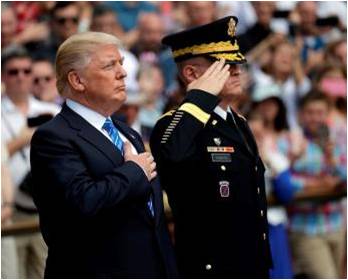Summary of the Presentation to the NSF on
AFGHANISTAN – THE TRUMP PLAN
“R4+S
with
With Lt Colonel (USA-Ret) Bill Conrad
Afghanistan has a long history of conflict. The Afghan Wars consisted of three conflicts beginning in 1839-1842, again in 1878-1880 and 1919. From here Great Britain sought to control Afghanistan and to oppose Russian influence in the “The Great Game”. The Soviet invasion lasted from 1979 until 1989. Operation Cyclone, aka “Charlie Wilson’s War”, involved the US, Pakistan and Saudi Arabia assisting the Mujahideen to defeat the Soviets.
This conflict created a vacuum. In this vacuum Al-Qaeda evolved, led by Osama bin Laden. During this time Madrasas (Muslim schools) were established by the Saudi Wahhabi, which evolved into the Taliban.
Civil war in Afghanistan involved primarily 12 Warlords, the Mujahideen (Jihadists), and the Taliban.
As a response to the bombings on 9/11, Operation Enduring Freedom started in 2001 and continues today. The purpose was to capture Osama bin Laden, destroy al-Qaeda and remove the Taliban. In this effort, the US sided with the Warlords.
A significant effort has been put forth by the US to build infrastructure in Afghanistan. It is said that where the roads end, the Taliban begins. To that end, rebuilding roads has been ongoing.
In 2008/2009 the Surge separated the troops from the Afghan people with a total of 140,000 US coalition troops present.
In 2012 new rules of engagement were implemented. These rules were risk averse and in 2014 the combat operations with the Taliban ended. There were 8,500 non-combat soldiers at that time. Afghan forces were left on their own, with no air cover to battle the Taliban, often taking heavy casualties.
Trump’s plan “R4+S”, Regionalize, Realign, Reinforce, Reconcile and Sustain the south Asia strategy.
This broader approach to America’s most pressing national security concerns are now consistent with efforts in Iraq and Syria.
Specifically stating that we are not nation-building again, and declaring that we are killing terrorists, is President Trump’s message to differentiate his plan from failed approaches in the past.
This plan puts pressure on Pakistan to fight the Taliban in tribal areas and to deny the Taliban and other extremists the advantage of anticipating US military moves.
President Trump has decentralized military decision making from the White House and has delegated authority to his Defense Secretary and warzone commanders.
This plan has the following elements that have the opportunity to be successful:
· Right People (Gen “Mad Dog” Mattis and Gen Dunford)
· Delegating Authority to Field Commanders
· Removing Politics from day to day operations
· Embedding US Advisors
· Providing Air Support
· Afghan Forces are moving from the defensive to the offensive.
· Condition-based (rather than time-based) withdrawal
Where do we go from here?
With the education and culture in mind, it will take a generation to stabilize the region. Gen. Mattis has responded to the question of, “Will the US still be in Afghanistan 10 years from now”, stating “certainly, we may have advisers there 10 years from now, but the Taliban will not be the enemy they are”
During the question and answer section of the program Bill was asked about Iran and the role it plays in Afghanistan. He responded by saying Iran plays a small role with not much involvement, but they are supplying improved IED’s.
Bill discussed the makeup of Afghan officials. About 1/3 of them and professors are communist, of the Russian persuasion.
Russia wiped out all of Afghanistan’s intelligence and army. America has had to train Afghanistan on how to fight and to develop officers.
When air support ended in 2014, the Afghan Air Force was not ready and there was a counter insurgency.
A question regarding the opium trade was asked, specifically does it permeate and is everyone involved? He answered by saying that the warlords are generally complicit, while the Royal Afghan forces are generally not. Karzai controlled the drug trade, and opium is still a major crop. He went on to note that the opium trade is controlled by the Russian mafia and moves through Turkey to Europe with little if any making it to the US.
When asked about how the government can become stable, Bill responded that Abdullah Abdullah serves as the Chief Executive of the Islamic Republic of Afghanistan and is not a warlord. A better government and better people are in place and we are starting to see a modernized army.
When asked about the conditions that would need to exist that would allow the US to leave, Bill responded “When there was a stable government and a strong military”. But, he added, Afghanistan is a central spot in the region and the US will most likely remain there indefinitely.
Bill went on to say that the Afghan people are very tribal and a mix of Islamic beliefs and tribal cultures. As a whole, they are not radical people.
Bill concluded his remarks stating that he believes we have the right balance and if Afghanistan is stabilized Pakistan will come along.
Bill Conrad served in Afghanistan several times, including two tours as an Army Lt. Colonel Civil Affairs officer, and another two tours as a DOD civil servant (GS-15) with both the French Army and with coalition forces at the ISAF Joint command headquarters in Kabul.
Below is a link to the presentation materials


